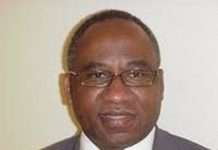For pharmacists to make meaningful contributions to nation building, they must fully understand and uphold the responsibilities attached to their professional calling, says eminent pharmacist and entrepreneur, Pharm. (Sir) Ike Onyechi, founder and managing director, Alpha Pharmacy and Stores Limited and national president, Christian Pharmacists Fellowship of Nigeria (CPFN).
Sir Onyechi, a Fellow of both the Pharmaceutical Society of Nigeria (PSN) and the West African Postgraduate College of Pharmacists (WAPCP) said this while delivering a keynote address on the topic, “The Community Pharmacist’s Role in Nation Building: The Past, Present and Future”, at the opening ceremony of the 36th Annual National Conference of the Association of Community Pharmacists of Nigeria (ACPN), held recently in Jos, Plateau State.
Pharm. Onyechi, an Alumnus of Lagos Business School, stated that the “community pharmacist” designation is small, compared to the enormous responsibility the profession confers on the practitioners, which can only be performed by those who are dedicated to it.
Citing the postulation of a group of scholars, Onyechi defined nation building as an effort to build institutions and practices that allow a people to govern themselves in peaceful and prosperous ways, adding that nation building principles include partners, process, problem solving, purpose and people.
He further noted that for community pharmacists to contribute to nation building, they must start preparing for tomorrow from today by striving to perform the roles of an eight-star pharmacist, who, according to him, is a caregiver, leader, decision-maker, communicator, lifelong-learner, teacher, care manager and researcher.
“As an eight-star professional, a pharmacist must be a medication expert; he must be able to think analytically, clearly and critically; he must be able to effectively use information, assume leadership role and demonstrate compassion and empathy in his role.
“Also, an eight-star pharmacist must be able to effectively manage resources and information to optimise patient care; must be responsible to assist with the education and training of the future generations of pharmacists; and also must possess a sense of unity with colleagues, among others,” he said.
According to him, the advancement of a profession is predicated on the number of societal problems it is able to solve and the degree of value it is able to add to the society, stressing that this also applies to a business, as it must be beneficial to its customers for it to thrive.
“By solving people’s health problems, pharmacists created a profession that improves man’s quality of life and adds value to other healthcare practitioners”, Onyechi said, adding that, “to know if you are truly contributing to nation building, you need to ask yourself: What position am I occupying in the eight-star parade? What value am I adding to my community, how much influence do I wield as a leader? How much problem have I solved? Who am I grooming and what will I like to be remembered for if I have only one more year to live?”
On the present trend in pharmacy practice, Onyechi disclosed that pharmaceutical care is now patient-centered, outcomes-oriented practice that requires the pharmacist to work in concert with the patient and the other healthcare providers to promote health, to prevent disease, and to assess, monitor, initiate, and modify medication use to ensure that drug therapy regimens are safe and effective.
He added further that the goal of pharmaceutical care is to optimise the patient’s health-related quality of life, and achieve positive clinical outcomes, within realistic economic expenditures, adding that the responsibility of the present-day community pharmacist is now geared towards being an expert in pharmaceutical care pharmacotherapy and health promotion, a professional who communicates with patients, other healthcare providers and decision makers, to deliver high quality products, services and communication.
“Responsibilities also include cross-checking and dispensing of prescription drugs, providing advice on drug selection and usage to doctors and other healthcare professionals and counselling patients in health promotion, disease prevention and proper use of medicines. Pharmacies also now offer the extended role that provides more clinical roles to patients as part of a primary healthcare team,” he said.
Pharm. Onyechi also urged the Pharmaceutical Society of Nigeria (PSN) and Association of Community Pharmacists of Nigeria (ACPN), PSN to lead efforts in ensuring that pharmacists are collaborating with other healthcare professionals to improve the quality of healthcare, noting that as medicine has expanded to include so many specialisations, so also should pharmacy and other health professions.











